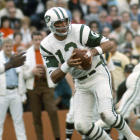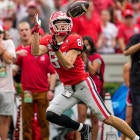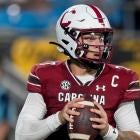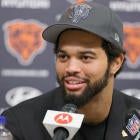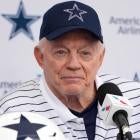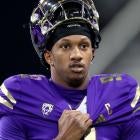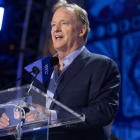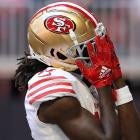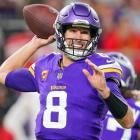When Super Bowl LIV kicks off this Sunday night, it'll make history. The NFL championship will take place in Miami for the 11th time, breaking the tie with New Orleans for the city to host the most Super Bowls ever. This venue has seen plenty of awesome Super Bowls in the past, and we don't expect this season's battle between the San Francisco 49ers and Kansas City Chiefs to be any different. Get your popcorn ready.
The Super Bowl has been played for 54 years and Miami has hosted some of the most thrilling battles, from the iconic Orange Bowl to the modernized Hard Rock Stadium. This will be the 49ers' second Super Bow in the Sunshine State and the first Miami Super Bowl for the Chiefs, who won their lone Super Bowl in Tulane Stadium in January of 1970.
Before the Chiefs and 49ers face off in Super Bowl LIV, we decided to rank the first 10 Super Bowls played in Miami.
10. Super Bowl XXIX: 49ers rout Chargers while becoming "first to five"
Most fans would agree that the NFL's real Super Bowl in 1994 took place in Candlestick Park two weeks before Super Bowl XXIX, when the 49ers dethroned the defending two-time champion Cowboys, who had beaten the 49ers in the previous two NFC title games. With the game's outcome never in doubt, Super Bowl XXIX served as Steve Young's ticket to immortality, as Young threw a Super Bowl-record six touchdown passes that included two to Ricky Watters and three to Jerry Rice, who caught 10 passes for 149 yards despite playing a portion of the game with an injured shoulder.
Young, who went 25 of 35 for 325 yards, also led both teams with 49 yards rushing. His performance highlighted San Francisco's 49-26 victory that made the 49ers the first team to own five Lombardi Trophies.
On this #TBT we celebrate Steve Young's birthday by highlighting his performance in Super Bowl XXIX.
— NFL Films (@NFLFilms) October 11, 2018
Young threw a record six touchdown passes, the most by any QB in a Super Bowl!@49ers #GoNiners pic.twitter.com/1Rnrhqqtap
9. Super Bowl XXXIII: Elway ends career with MVP, back-to-back titles
Everyone expected the defending champion Broncos to face the Vikings, who had gone 15-1 during the regular season. But after Minnesota was upset by the "Dirty Bird" Falcons in the NFC Championship Game, much of the hype surrounding the Super Bowl had all but vanished.
The game, as expected, was a rout, with the Broncos jumping out to a 31-6 lead before coasting to a 34-19 victory. The only surprising aspect of Super Bowl XXXIII was how the Broncos' offense did their damage. With the Falcons' defense geared up to stop Terrell Davis, the reigning league and Super Bowl MVP, the star of the Broncos' offense was none other than John Elway, whose 336 yards passing and two touchdowns earned him the game's MVP award. Elway, who retired during the offseason, gave the Broncos a 17-3 lead on his 80-yard strike to Rod Smith with five minutes left in the first half. His three-yard scoring plunge minutes into the fourth quarter clinched the Broncos' second consecutive Super Bowl title.
No. 14: 1998 @Broncos, @SuperBowl XXXIII Champions #BroncosCountry
— NFL (@NFL) November 16, 2019
📺: #NFL100 Greatest Teams on @NFLNetwork pic.twitter.com/VNa9Q9r8eU
8. Super Bowl II: Packers win third straight title, send Lombardi off as a winner
Miami's first Super Bowl was the site of Vince Lombardi's final game as the Packers' head coach. A year after defeating the AFL's Chiefs in the first Super Bowl, Green Bay defeated the Raiders with similar ease a year later in Super Bowl II. The Packers, who held a modest 16-7 lead at halftime, stretched their lead to 26-7 after three quarters. With Lombardi's fifth world title within his reach, Packers cornerback Herb Adderley's 60-yard interception return for a score early in the fourth quarter put the game on ice.
As he did a year earlier, Packers quarterback Bart Starr took home the MVP award after leading Green Bay's offense on six scoring drives. Starr was also responsible for the game's biggest offensive play: his 62-yard touchdown pass to Boyd Dowler which gave Green Bay a 13-0 second quarter lead. The Packers' defense, led by Adderley, defensive linemen Willie Davis and David Robinson, linebacker Ray Nitschke and defensive back Willie Wood, held the Raiders to just 16 first downs and 293 total yards.
Super Bowl II Throwback! #Packers #GoPackGo pic.twitter.com/Nqf4niXa6B
— PACKER'S 24/7™ 💛💚 (@Planet_Packers) August 18, 2016
7. Super Bowl XLIV: Brees, Saints win one for the Big Easy
In many ways, the Saints served as a symbolic symbol for the city of New Orleans following the devastation caused by Hurricane Katrina. While the 2006 Saints symbolized the city's fighting spirit, the '09 team put an exclamation point on the city's rebirth and revival.
After needing a dramatic overtime win to defeat Brett Favre and the Vikings in the NFC Championship Game, Drew Brees and the Saints became the second team in Super Bowl history to overcome a 10-0 deficit. Trailing Peyton Manning and the Colts early in Super Bowl XLIV, the right arm of Brees, the right foot of kicker Garrett Hartley, and Sean Payton's decision to begin the second half with an onside kick were three of the main reasons why the Saints came from behind to beat the Colts. While Hartley successfully connected on three field goal attempts, Brees earned MVP honors after going 32 of 39 for 288 yards included touchdown passes to running back Pierre Thomas and tight end Jeremy Shockey.
With the Saints protecting a 24-17 lead late in the contest, cornerback Tracey Porter's 74-yard pick-six clinched the Saints' 31-17 victory as well as the franchise's first-ever Super Bowl title.
🗣 "You won a Super Bowl!" 🗣
— NFL Network (@nflnetwork) September 28, 2019
The @Saints recall their second half comeback in Super Bowl XLIV 👇
📺: NFL 100 GREATEST GAMES on NFL Network pic.twitter.com/XtjdujoIk0
6. Super Bowl XLI: Peyton Manning's moment
After several gut-wrenching playoff losses, Peyton Manning and the Colts finally broke through in 2006. After defeating the Chiefs and Ravens in the first two rounds of the playoffs, the Colts trailed Tom Brady and the Patriots 21-3 before rallying to win one of the greatest AFC/NFC title games of all-time.
While it wasn't a terribly exciting game, the Colts' 29-17 win over the Bears had its moments. It started with Devin Hester taking the opening kickoff 92 yards for a touchdown. The game also included Manning's 53-yard touchdown pass to Reggie Wayne and Kelvin Hayden's 56-yard interception return for a score to ice the game. The Colts' victory also included notable performances from Indianapolis running backs Joseph Addai and Dominic Rhodes, who combined to tally 264 total yards and a touchdown on 52 touches.
Super Bowl XLI is the first Super Bowl that was played predominately in rainfall. It was also the first Super Bowl won by a black coach, as Tony Dungy helped deliver the Colts' first championship since the franchise moved from Baltimore to Indianapolis 22 years earlier.
🚨 41 DIAS PARA O @SUPERBOWL 🚨
— NFL Brasil (@NFLBrasil) December 25, 2017
Debaixo de muita chuva e grande atuação do Peyton Manning, o @Colts levou a melhor no Super Bowl XLI! #NFLBrasil pic.twitter.com/bt5LIBluxl
5. Super Bowl V: O'Brien boots Baltimore to a world championship
Super Bowl V remains arguably the most bizarre Super Bowl of all-time. It is the first Super Bowl that was decided on a game-winning kick, as Colts' rookie kicker Jimmy O'Brien, who missed an extra point earlier in the game, booted a 32-yard field goal with five seconds left to give the Colts a 16-13 win over the Cowboys. The game is also remembered for its comedy of errors that included 11 turnovers. Super Bowl V also included what was, as the time, the longest play in Super Bowl history: Johnny Unitas' 75-yard touchdown pass to tight end John Mackey which tied the score one minute into the second quarter.
The third Super Bowl ever played in Miami also included some irony at the quarterback position. Two years after replacing an ineffective Earl Morrall during the Colts' loss to the Jets in Super Bowl III, it was Morrall who came off the bench to relieve an injured Unitas during Super Bowl V. While Morrall (who entered the game with the Colts trailing 13-6) technically led the Colts on a pair of scoring drives, both scores were set up by interceptions. The second pick, recorded by linebacker Mike Curtis, set up O'Brien's game-winning kick.
Super Bowl V remains the only Super Bowl where the MVP came from the losing team. Chuck Howley, who recorded two interceptions in a losing effort, was named MVP of the game, an award he would add to with a Super Bowl ring after the Cowboys defeated the Dolphins the following year in Super Bowl VI.
No. 72: 1970 @Colts, @SuperBowl V Champions #Colts
— NFL (@NFL) November 9, 2019
📺: #NFL100 Greatest Teams on @NFLNetwork pic.twitter.com/2vB9sGsyiH
4. Super Bowl X: Swann lifts Steelers to thrilling victory over Cowboys
After nine somewhat blasé Super Bowls, Super Bowl X broke the mold while helping elevate the popularity of the NFL's biggest game. With an estimated 80 million fans watching, Steelers receiver Lynn Swann recorded one of the greatest performances in Super Bowl history, as his four-catch, 161-yard performance lifted Pittsburgh to a 21-17 victory over the Cowboys. While Swann's 53-yard catch over Mark Washington is his most famous catch from this game, it was his 64-yard catch from Terry Bradshaw that nearly put the game on ice.
The Cowboys, who led 10-7 at halftime before allowing four consecutive scores by the Steelers, cut the deficit to four points with 1:56 to play. The Steelers then withstood Cowboys quarterback Roger Staubach's Hail Mary heave into the end zone on the game's final play. Staubach's pass was deflected in the end zone before being corralled by Steelers cornerback Glen Edwards, who sealed the Steelers' second straight Super Bowl title.
Super Bowl X is also remembered for Jack Lambert's infamous throw-down of Cowboys' safety -- and 2020 Hall of Fame inductee Cliff Harris after Harris taunted Pittsburgh kicker Roy Gerella after his second missed field goal attempt. The incident fired up the Steelers and Lambert, who finished the game with game-high 14 tackles.
This day in #PGHistory: In Miami, the Steelers win Super Bowl X, defeating the Dallas Cowboys 21-17. (1976)
— Pittsburgh Clothing Co. (@PGHClothingCo) January 18, 2019
Lynn Swann, who had 161 yards and a touchdown, became the first wide receiver to be named Super Bowl MVP. pic.twitter.com/DbLqvapTn4
3. Super Bowl XIII: Steelers defeat Cowboys in the "Battle of Champions"
NFL Films fittingly coined Super Bowl XIII as the "Battle of Champions" during their highlight video documenting Pittsburgh's second Super Bowl win over Dallas. In a game that featured 15 future Hall of Fame players, Super Bowl XIII pitted the defending champion Cowboys against the two-time champion Steelers.
After two turnovers by Steelers quarterback Terry Bradshaw helped give the Cowboys a 14-7 lead, Bradshaw fired back, as his 75-yard touchdown pass to John Stallworth tied the score in the second quarter. Following a Mel Blount interception of Staubach, Bradshaw ended the first half with a 7-yard touchdown pass to Rocky Bleier, as Bradshaw broke Bart Starr's 12-year-old record for passing yards in a Super Bowl by halftime.
Following a third quarter drop by Cowboys tight end Jackie Smith that would have tied the score, two Steelers touchdowns in an 11-second span appeared to give the Steelers an insurmountable 35-17 lead. After Franco Harris' 22-yard touchdown run stretched the lead to 11 points, Dennis "Dirt" Winston's recovery of Randy White's kickoff return set up Bradshaw's 18-yard touchdown pass to Swann.
Undaunted, Staubach, running back Tony Dorsett and receiver Drew Pearson led the Cowboys on two late scoring drives to pull to within four points with 22 seconds left. Dallas' comeback bid was dashed, however, when Bleier recovered the Cowboys' second onside kick of the quarter. After being mocked by Cowboys linebacker Thomas "Hollywood" Henderson before the game, Bradshaw earned MVP honors after throwing for 318 yards and four touchdowns, as the Steelers became the first franchise to win three Lombardi Trophies. In the process, the Steelers earned the title as the "Team of the '70s."
No. 17: “Battle of Champions” - Super Bowl XIII Steelers vs. Cowboys (Jan. 21, 1979) #NFL100 @steelers
— NFL (@NFL) October 5, 2019
📺: NFL 100 Greatest Games on @nflnetwork pic.twitter.com/vShlamhVfc
2: Super Bowl XXIII: "The Drive"
In one of the most competitive games in Super Bowl history, the 49ers, considerable favorites heading into the game, were pushed to the limit before rallying to defeat the gritty Bengals in the game's final seconds.
The Bengals, led by hard-hitting safety David Fulcher, held Joe Montana, Jerry Rice and the rest of the 49ers' mighty offense to just 13 points during the game's first 59 minutes, 26 seconds. In fact, the game's leading scorer for most of the night was Bengals' kicker Jim Breech, whose third field goal of the game gave Cincinnati a 16-13 lead with 3:10 remaining. The Bengals' only other points were scored by Stanford Jennings, whose 93-yard kickoff return for a score gave the Bengals the lead entering the game's final stanza.
Trailing by three in the game's final minutes, Montana led the 49ers' offense on a 92-yard drive that included three completions for 51 yards to Rice, who won game MVP honors after catching 11 passes for a record 215 yards and a touchdown. The 11-play drive culminated with Montana's 10-yard touchdown pass to John Taylor with 34 seconds remaining, as the 49ers escaped with a 20-16 victory in what was Hall of Fame coach Bill Walsh's final game as the 49ers' coach. Like the Steelers a decade earlier, the 49ers' win over the Bengals gave them their third Super Bowl win of the decade while giving them the title as the "Team of the '80s."
🗓 January 22nd, 1989
— San Francisco 49ers (@49ers) January 22, 2017
📍 Miami, FL
MVP: @JerryRice
Relive the drama of Super Bowl XXIII pic.twitter.com/vPIkBREpEH
1. Super Bowl III: Broadway Joe's guarantee
After the Packers made quick work of the Chiefs and Raiders in the first two Super Bowls, the AFL champion Jets were 18-point underdogs to the NFL champion Colts entering Super Bowl III. But during the week of the game, Jets quarterback Joe Namath boldly guaranteed victory while accepting an award at the Miami Touchdown Club. Namath then went out and backed up his prediction in the most shocking upset in pro football history.
The Colts, who lost just one game during the 1968 season, committed several uncharacteristic mistakes that included three interceptions from quarterback Earl Morrall, who was named the NFL's MVP during the '68 season. With Morrall and the Colts' offense shooting themselves in the foot, Namath governed over a physical Jets offensive attack that was led by running back Matt Snell, who rushed for 121 yards and a on 30 carries. His four-yard touchdown run gave the underdog Jets an 7-0 halftime lead over Don Shula's Colts.
The Colts' continued to struggle at the start of the second half, as running back Tom Matte's fumble on Baltimore's first possession of the half set up the first of three second half field goals by Jets kicker Jim Turner. After New York extended their lead to 13-0, a 39-yard completion from Namath to receiver George Sauer set up Turner's third field goal with 13:58 left.
Trailing by 16 points, Hall of Fame quarterback Johnny Unitas, who backed up Morrall during the '68 season, led the Colts to their only scoring drive, as Jerry Hill finally got Baltimore on the board with 3:32 left. But after recovering the onside kick, the Colts were shut down by the Jets' defense, a unit that was led by defensive backs Randy Beverley, Jim Hudson, Johnny Sample, linebacker Ralph Baker, defensive linemen Gerry Philbin, John Elliott and Verlon Biggs, and linebacker Al Atkinson.
Fittingly, the game ended with an incomplete pass from Unitas, who tried in vein to deny the Jets an historic victory. But in the end, Unitas and the Colts were unable to stop Namath and the Jets from their date with destiny, as their 16-7 win in Super Bowl III changed the face of football forever.
"I've got news for you. We're gonna win the game. I guarantee it."
— New York Jets (@nyjets) January 3, 2020
Vote Super Bowl III as the #NFL100 greatest moment → https://t.co/lxVAxEPb01 pic.twitter.com/mbRW7paQ7g
Where will Super Bowl LIV ultimately land on this list? Tune in on Feb. 2 to find out.













